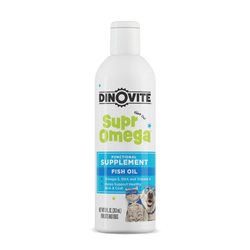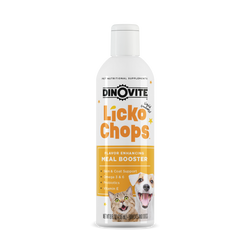Helping Your Dog Through Seasonal Allergies

Seasonal Allergies in Dogs: Causes, Symptoms, and Treatments
As the seasons change, environmental allergens like pollen, mold, and dust mites become more prevalent, causing discomfort for many dogs. If your dog seems to scratch more during certain times of the year, sneezes frequently, or has watery eyes, they could be dealing with dog seasonal allergies.
Understanding the causes, symptoms, and treatment options can help you provide relief and improve your dog's quality of life. In this guide, we’ll explore common allergens, symptoms to watch for, and the best treatments—including home remedies for dog allergies.
Common Causes of Seasonal Allergies in Dogs
Dogs can develop allergies just like humans. The most common seasonal allergens include:
- Pollen – Tree, grass, and weed pollen are major culprits, especially in the spring and fall.
- Mold Spores – Mold thrives in damp conditions, which become more prevalent during rainy or humid seasons.
- Dust Mites – These microscopic pests are present year-round but can worsen as homes become sealed up in colder months.
- Flea Bites – Flea saliva is a common allergen that can trigger intense itching and skin irritation, especially in warmer months.
Symptoms of Seasonal Allergies in Dogs
Dog seasonal allergies symptoms can vary from mild to severe. While some dogs may only show subtle signs, others can experience significant discomfort. Here are the most common symptoms to watch for:
- Itchy Skin – The most common sign, usually affecting the paws, face, belly, and armpits.
- Excessive Licking – Dogs may lick or chew their paws and other areas in an attempt to relieve itchiness.
- Red or Inflamed Skin – Irritation can cause redness, swelling, and even sores.
- Ear Infections – Allergies can lead to secondary infections, causing redness, discharge, and odor in the ears.
- Respiratory Symptoms – Watery eyes, sneezing, and nasal discharge can occur, similar to hay fever in humans.
Dog Seasonal Allergies Sneezing
One of the most noticeable signs of seasonal allergies in dogs is frequent sneezing. If your dog suddenly starts sneezing more than usual, especially after spending time outdoors, it may be due to pollen exposure. Other signs that accompany sneezing include:
- Runny nose with clear discharge
- Watery or itchy eyes
- Reverse sneezing (a rapid, forceful inhalation through the nose)
- Scratching at the face or rubbing it against furniture
Sneezing alone is not always a cause for concern, but if it persists or is accompanied by other allergy symptoms, it may be time to explore treatment options.
Dog Seasonal Allergies Eyes
Just like humans, dogs can experience irritated, itchy, or watery eyes due to seasonal allergies. This occurs when allergens like pollen or mold spores come into contact with the sensitive membranes of the eyes. Signs of allergy-related eye issues in dogs:
- Redness around the eyes
- Excessive tearing or watery eyes
- Squinting or pawing at the face
- Swollen or puffy eyelids
If your dog’s eye symptoms are severe, or if there is thick or discolored discharge, it’s important to consult your vet to rule out infections or other eye conditions.

How to Treat a Dog's Seasonal Allergies
Dog seasonal allergies treatment depends on the severity of symptoms. While some cases can be managed at home, others may require veterinary intervention.
Veterinary Treatments
If your dog’s allergies are persistent, your vet may recommend:
- Antihistamines – Medications like Benadryl (diphenhydramine) or Apoquel can help reduce itching and inflammation.
- Corticosteroids – For severe cases, steroids may be prescribed to manage intense allergic reactions.
- Allergy Testing & Immunotherapy – In cases of chronic allergies, your vet may conduct tests to identify specific allergens and recommend allergy shots to help desensitize your dog.
- Medicated Shampoos & Sprays – Prescription-strength shampoos can soothe irritated skin and remove allergens from your dog’s coat.
How to Reduce Dog Allergens
Reducing allergen exposure is key to managing your dog’s seasonal allergies. Here are some strategies to help minimize allergens in your home and environment:
- Bathe Your Dog Regularly – Use a gentle, hypoallergenic shampoo to wash away pollen and allergens from your dog’s coat.
- Wipe Paws After Walks – Use pet-safe wipes to remove allergens from paws before your dog enters the house.
- Keep Your Home Clean – Vacuum carpets and upholstery frequently and wash your dog’s bedding weekly.
- Use an Air Purifier – A HEPA air filter can help trap airborne allergens and improve indoor air quality.
- Limit Outdoor Exposure – On high-pollen days, keep your dog indoors as much as possible, especially during peak pollen hours (morning and evening).
Should I Take My Dog to the Vet for Seasonal Allergies?
If your dog's symptoms are mild, you may be able to manage them at home with grooming and allergen control. However, you should see a vet if:
- Symptoms persist despite home treatment
- Your dog develops secondary infections (skin or ear infections)
- Itching leads to open sores or hair loss
- Respiratory symptoms (sneezing, coughing, difficulty breathing) become severe
A vet can provide a tailored treatment plan to help your dog find long-term relief.

Home Remedies for Dog Allergies
If you’re looking for natural ways to soothe your dog’s seasonal allergies, consider these home remedies:
- Oatmeal Baths. Oatmeal has natural soothing properties that can help relieve itching and inflammation. Mix finely ground oats with warm water and let your dog soak for 10-15 minutes.
- Coconut Oil. Rich in anti-inflammatory properties, coconut oil can be applied to itchy skin to provide relief. It can also be added to your dog’s diet to support skin health.
- Apple Cider Vinegar Rinse. A diluted apple cider vinegar rinse (50/50 mix with water) can help remove allergens from your dog’s skin. Avoid applying it to open wounds.
- Quercetin Supplements. Known as “nature’s Benadryl,” quercetin is a natural antihistamine found in foods like apples and blueberries. Some pet-safe supplements contain quercetin to help manage allergies.
- Fish Oil & Omega-3s. Omega-3 fatty acids from fish oil or salmon oil can help reduce inflammation and support healthy skin.
- Probiotics for Immune Support. Since 70% of your dog’s immune system is based in their gut, probiotic supplements like Dinovite for Dogs may help strengthen immune function and reduce allergy symptoms.
Final Thoughts
Seasonal allergies can be frustrating for both dogs and their owners, but with the right management strategies, your pup can find relief. By identifying allergens, watching for symptoms, and implementing both veterinary and home remedies, you can help your dog enjoy every season with ease.
If your dog’s symptoms become severe or persistent, always consult your veterinarian for the best course of action.
*All information is for educational purposes only and is not intended to replace the expert advice of a veterinarian.
Related Products


